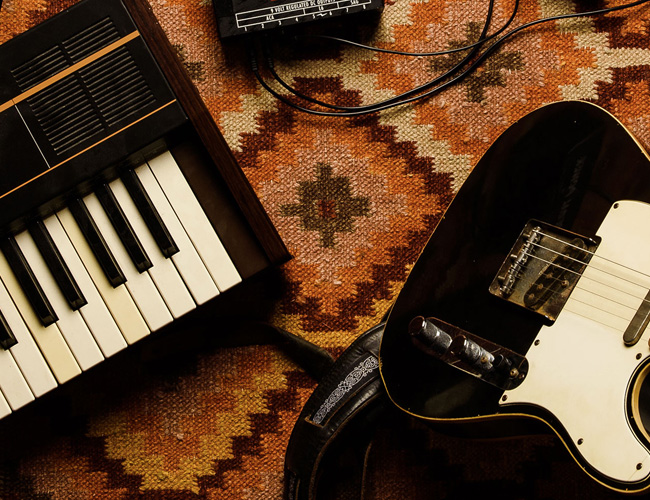When John Mayer announced his split with Fender in 2014, he initiated what would become one of the more discussed chains of events to take place within the guitar market over the past decade. Mayer left behind the signature Strat pantheon of Clapton, Yngwie, and SRV to join up with Paul Reed Smith, eventually unveiling the Silver Sky, a Strat-shaped signature model that would prove to be one of the more controversial guitar releases in recent memory.
This rather public breakup between a famous guitarist and famous guitar brand—and the resultant new model—had the immediate consequence of giving the online guitar community plenty of fodder for debate. A less-discussed effect, though, can be traced through the sales data here on Reverb, as prices on the now-discontinued Mayer signature Fender model started to creep up and up.
While Mayer may be the most obvious recent example, a wider view of the market around used signature guitars shows many other instances where a discontinued or limited-edition artist model steadily increases in value in the years following the end of their production often selling for more than the guitar's original retail price. It's not categorical and there are many signature models that get discontinued for normal business reasons and stay relatively static or go down in value. There remain, however, enough of these guitars that lie at that intersection of rare and coveted to warrant some specific investigation. Today, we're looking at 17 such examples. There are, undoubtedly, many others I didn't uncover in my search—let us know if you can think of any others in the comments.
Discontinued Signature Strats:
Mark Knopfler, Billy Corgan, John Mayer, Kenny Wayne Shepherd, Wayne Kramer
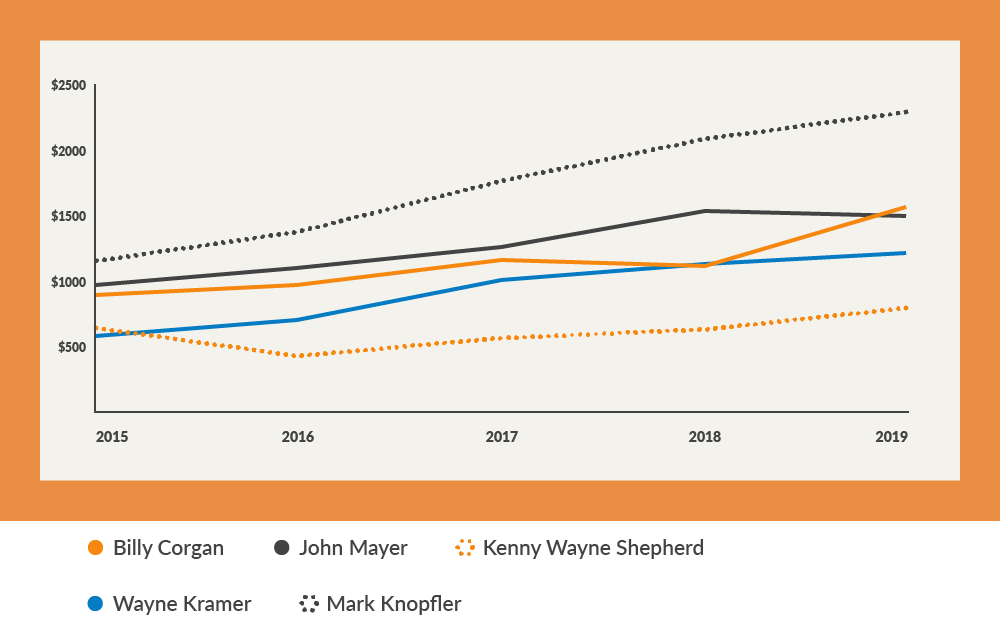
As described above, the John Mayer Signature Stratocaster ended its run at Fender in 2014, having been launched in 2006. The special appeal of this guitar relative to other Strats centered on its Big Dipper pickups, which add a mid-range scoop to the tone and aren't found in any other Fenders. When this guitar was in production, the going used price for the standard Sunburst model was around $900 to $1,200 USD. Most recently, prices on that model have climbed to around $1,700 to $2,100, with more for the rarer or limited-edition finishes, though things have leveled off a bit in 2019. A set of Big Dipper pickups alone can sell for over $500.
A similar series of events surrounded the Billy Corgan Signature Stratocaster, which was produced by Fender from 2008 until 2012. Corgan too has since split up with Fender, publically commenting on it last year, and currently tours with a set of slick signature models made by Reverend. His Fender Strat—which sports a '70s-style headstock, a thin nitro finish, a hardtail setup, and a set of custom, single-spaced DiMarzio humbuckers—has been selling for more than $2,000 recently. There have been some deals pop up though in the sub-$1,200 range, so if this guitar intrigues you, definitely add an alert to your Reverb Feed and you might be able to land one at a somewhat less elevated price.
Also making the list of signature Strats comes the Wayne Kramer model, which was launched as a limited run in 2011 and houses a humbucker in the middle position along with an American flag paint job modeled on Kramer's original jam kicker–outer. The Kenny Wayne Shepherd had its own custom pickups along with some distinct graphic options on the finish. Puzzlingly, the Knopfler signature—the most highly valued of the bunch—is a relatively standard-issue Strat, apart from its distinct Hot Rod Red finish. It could just be that Mr. Knopfler's particular picking panache is enough to bolster the appeal of this model to his fanbase.
Fender Signature Offsets:
Thurston Moore, J Mascis, Kurt Cobain
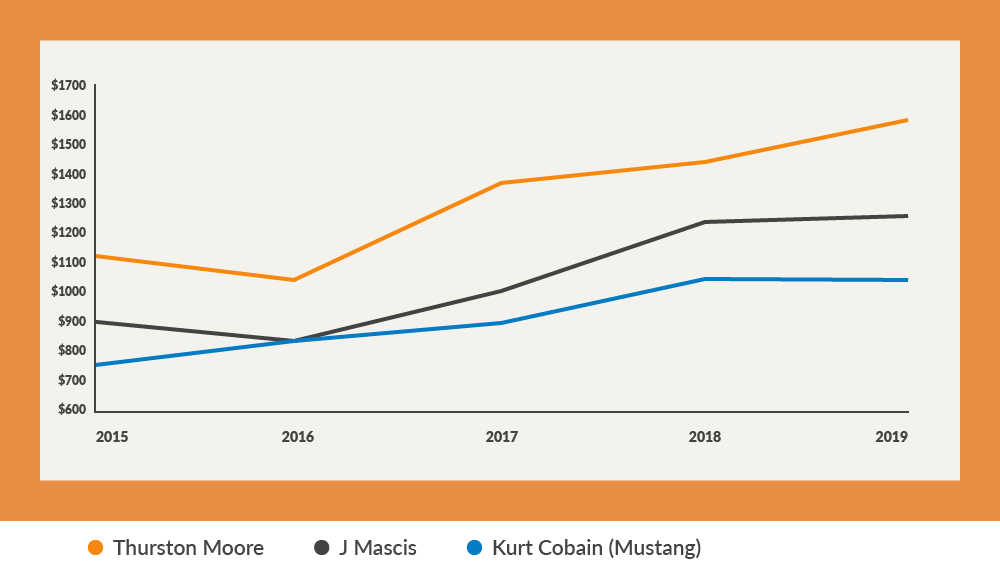
There have always been fewer Jazzmaster, Jaguar, and Mustang variants in the Fender catalog than Strats, and while more and more seem to enter the lineup every year, as these models' popularity resurged in the mid-aughts, the odd MIJ import or signature model were some of the only ways for the indie rock set to buy a non-vintage specimen in the offset category.
The J Mascis model came from Fender Japan and was, clearly, distinguished by its sparkly purple finish. It was made from 2007 till 2010, and part of its recent rise could relate to the ongoing popularity of the current production Squier J Mascis model.
The limited-edition Thurston Moore Jazzmaster, which ditches some of the more elaborate electronics of the classic design, was released a few years later as part of a set with a blue model made for Sonic Youth bandmate Lee Renaldo. While the Moore model has jumped in price over the past few years, the similar Renaldo Jazzmaster has remained essentially flat. Around this same time, Fender also made an Elvis Costello Signature Jazzmaster with a glossy walnut stain that is also highly desirable for Jazzmaster aficionados.
The Kurt Cobain Mustang is really more a tribute guitar than a proper signature model, but still has piqued some renewed interest since it left the line in 2015, especially for those examples with the blue racing stripe finish modeled after the Fender Competition Mustang of the late '60s and early '70s. The Cobain Jaguar is still in production, while the Jag-stang, the only Fender Cobain guitar designed in his lifetime, hasn't changed much in used price over the past several years.
'90s Rock Gibson Semi-Hollowbodies:
Dave Grohl, Chris Cornell, and Tom DeLonge
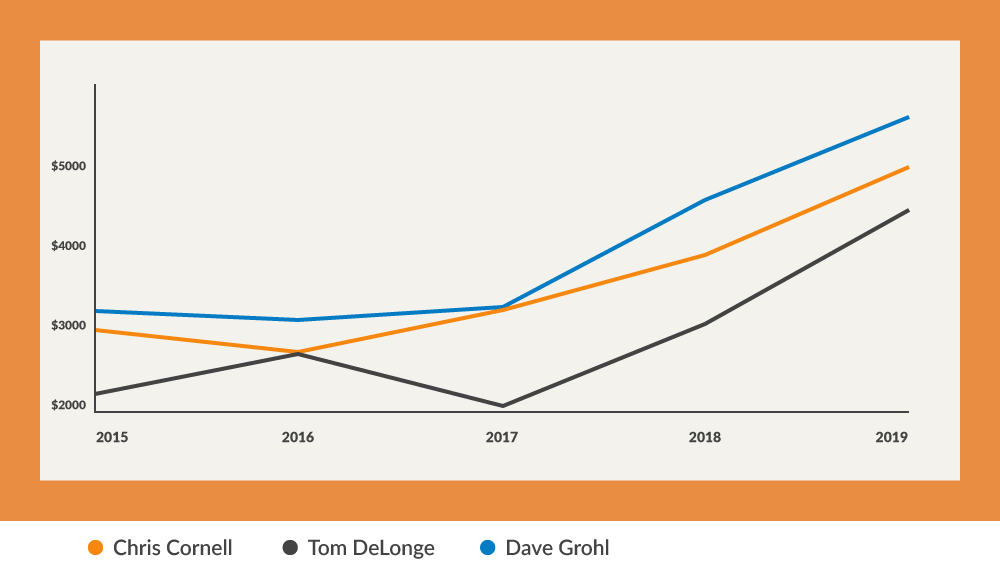
Next up, a triple set of Gibson signature semi-hollowbodies. You'll notice that all three of these guitars, along with most of the Fenders mentioned above, carry the names of rockstars of a '90s vintage. There's probably something to this: It could be that the generation of guitarists who came up idolizing the likes of Dave Grohl and Billy Corgan finally have enough extra scratch to buy the guitars they associate with the music of their youth. Whereas in a previous era, guitars associated with classic rock might dominate the collectors market, the buying power of Gen Xers may have caught up a bit, placing the '90s-era artist models in a more in-demand bracket.
In the case of the Dave Grohl signature, no doubt the model's appeal comes from a combination of his station as one of the world's remaining true rock stars, as well as the unique specs of the design itself. Officially called the DG-335, but sometimes referred to as the Dave Grohl ES-335, this guitar was produced in a few different batches by Gibson and was modeled after Grohl's own Pelham Blue Trini Lopez model. Distinguishing features include those Trini Lopez–style diamond f-holes and a slanted headstock. The visibility of this guitar has also had the apparent effect of lifting values on original Trini Lopez models, especially the exceptionally rare Pelham Blue examples.
The signature ES-335 of fellow grunge icon Chris Cornell was set apart by two distinct finishes—Olive Drab Green and Flat Black—and the use of two Lollartron pickups. Sadly, prices on this model seem to have been lifted by Cornell's untimely death, and since then, Gibson has announced its intention to build a limited run of this model later this year.
The Tom DeLonge model—which is a ES-333 rather than the more common ES-335—is set apart by its racing stripe finish and the use of just one humbucker and one control knob. Like the Tom DeLonge signature Strat before it, it seems like this guitar is in the sights of people just looking for this pared-back configuration and not just obsessive Blink-182 fans. While this model has left the Gibson lineup, it is still being built as an Epiphone.
Three Very Different Epiphones:
Zakk Wylde, Gary Clark Jr., Robb Flynn
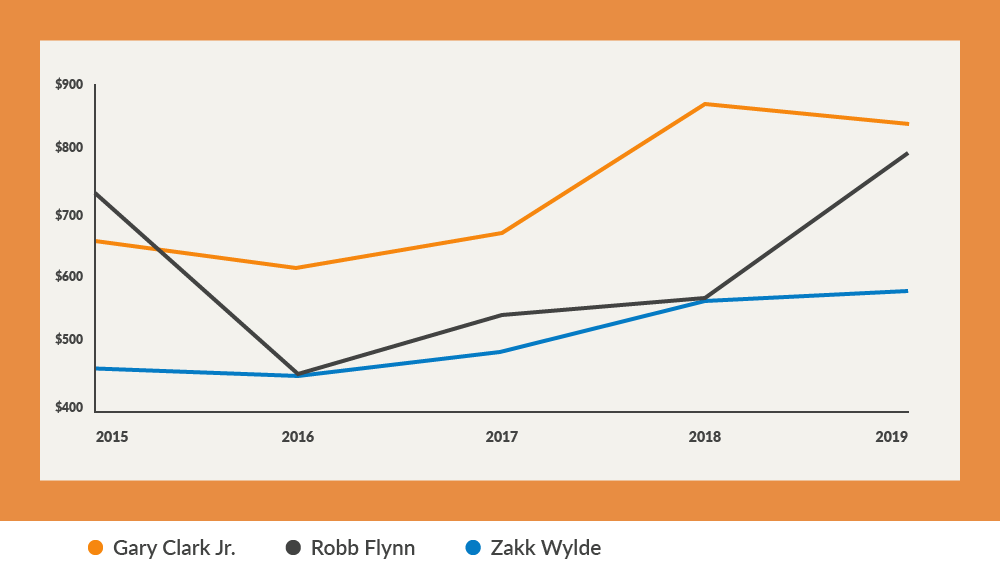
Moving down a notch in the price scale from the above Gibsons comes three rather distinct Epiphone signature models. While you might not think of modern Epiphone guitars as the most obvious target for collector interest, the company has produced lots of singular signatures that get high marks, including the rare Dwight Yoakam "Dwight Trash" Casino and an ever-growing list of limited-edition Joe Bonamassa models.
As far as models that have climbed in price recently, the scarcity of the Zakk Wylde signature Epiphone Les Paul—with its unmistakable bullseye finish—is the result of Zakk leaving the Epiphone and Gibson family to start his own brand, Wylde Audio.
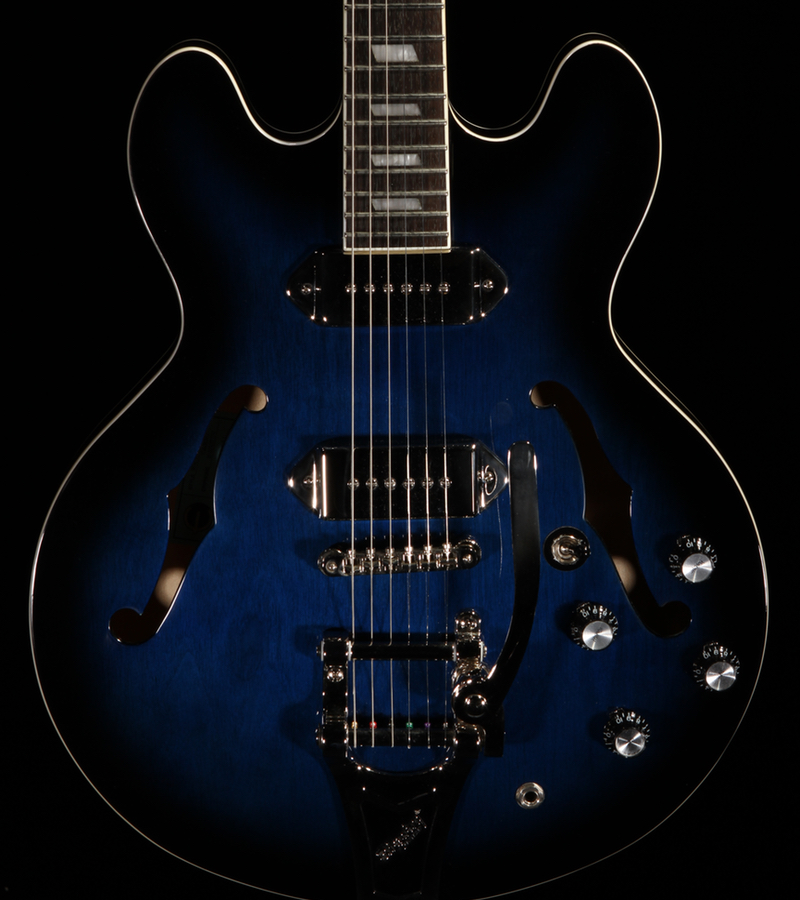
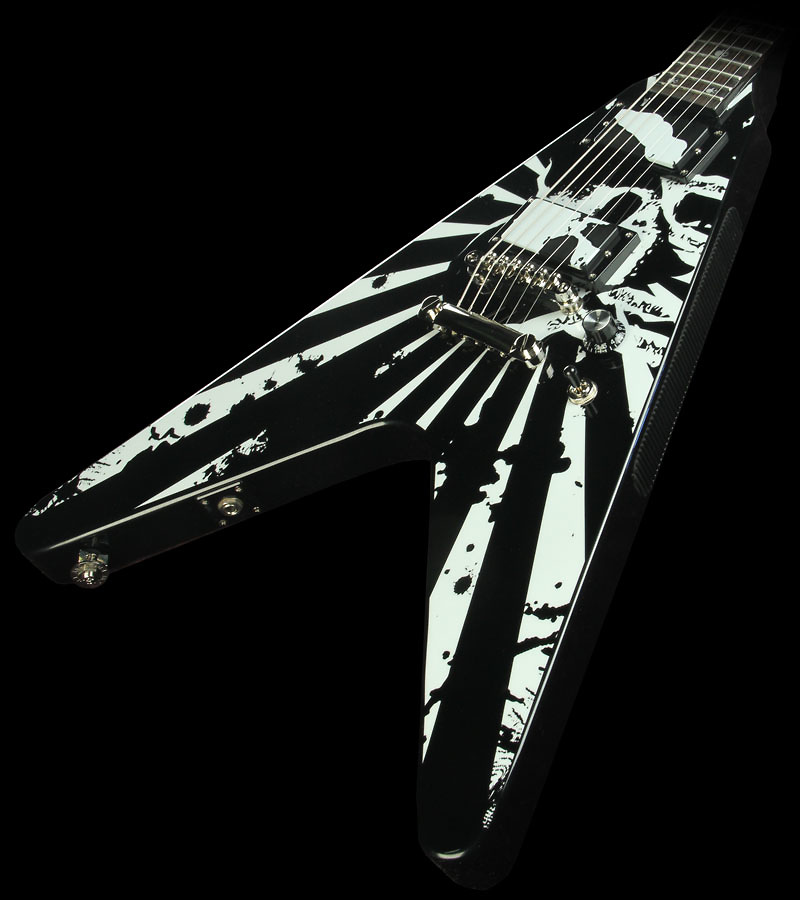
The Gray Clark Jr. Casino was released as a limited edition but its rave reviews and nifty "Blak and Blu" finish mean that used examples usually get snagged as soon as they hit the pages of Reverb. Gary Clark Jr. also has a signature Gibson SG, which appears to have been discontinued last year, though prices haven't moved much since then.
On the total opposite end of the stylistic spectrum from the Gary Clark Jr. model comes the Robb Flynn "Love/Death" Baritone V. Baritone guitars have a long history in metal, and while there are other signature baritones out there—including multiple ESP models made for Stephen Carpenter—this Flynn guitar is the only V-shaped bari made by Epiphone, which is to say nothing of its positively brutal paint job.
Robert Smith, Head and Munky, Steve Vai
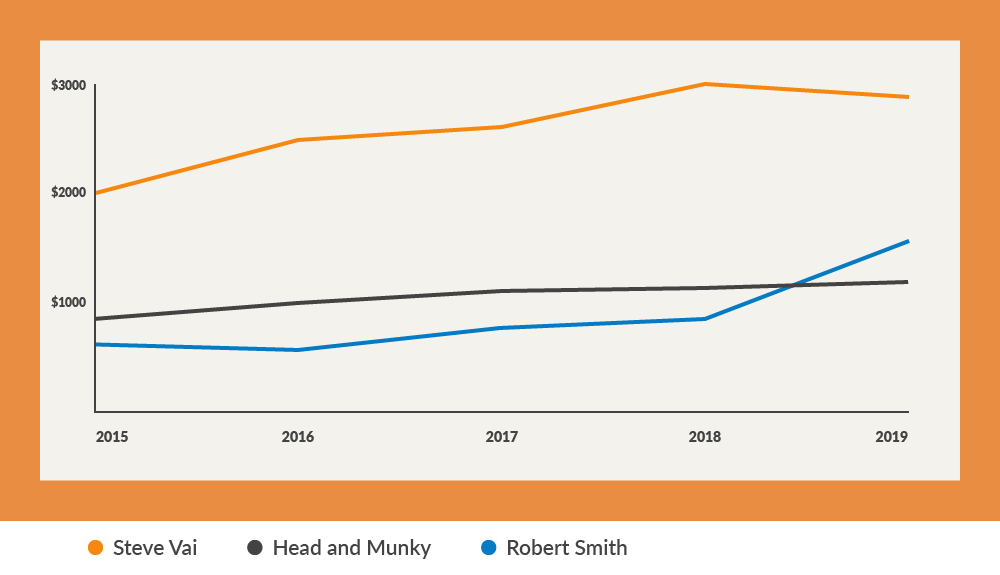
Finally, we come to a set of signature guitars unified by their lack of neat categorization into any of the above sections. First up, the Schecter Robert Smith UltraCure VI, a 30-inch scale, six-string bass in the mold of a Fender Bass VI. The influential guitar tone wizard behind The Cure has played Bass VI-style instruments for decades, and this model is one of an entire line of signature guitars built for Smith by Schecter. It was discontinued a few years back, and its recent price surge reflects both generally rising interest in this bass format as well as the enduring inter-generational popularity of The Cure's music.
Next up, the Ibanez K7. This model was launched as a signature design for James "Munky" Shaffer and Brian "Head" Welch of Korn. According to the invaluable Ibanez fan wiki, "After Head parted ways with Korn in 2005, Ibanez replaced the K7 series with the new APEX series in 2007. These are linked to Munky only…" The K7 was a seven-string, RG-style Ibanez with DiMarzio pickups and a tremolo device called a U-bar.
There was a more recent Head signature Ibanez called the KOMRAD20RS, but it was only offered briefly before Head switched endorsements to ESP. While the K7 has only risen a little in price over the past few years (and is still selling for less than the original retail price), the model does sell quickly when it comes up for sale, indicating some further-increased interest.
And finally, we come to one of the most significant, influential, and overwhelmingly multi-faceted signature guitar lines of all time: the Ibanez JEM, Steve Vai's iconic, handle-equipped shred machine. This design came out in 1987, and it's been said in some circles that interest in the first generation of JEMs has been on the rise for some time, especially for the original JEM777s.
I must admit, that the data here starts to get a little sketchy, as the JEM lineup is so multifarious with so many sub-models and wild, limited-edition finishes (most of which sell in extremely low volume), that it's difficult to generalize any trend for any specific release. That said, taking all the JEMs from the first five years or production in aggregate, and removing some specific outliers, you can still see an upward trend in generalized pricing on this classic signature design.
Now that we've seen some specific examples of discontinued signature guitars going up in value over time, it might be worth exploring some of the underlying mechanics of this distinct sub-section of the used guitar market.
To begin with, there are a variety of reasons why someone might seek out a specific signature model as opposed to more standard production fare. Most obviously, there's the fandom component. A player might seek the preferred specs of their hero in order to nail their technique or sound: If you want to replicate Jeff Beck's distinct playing style, a Jeff Beck Signature Stratocaster is an obvious choice. Beyond this motivation, there's also the sheer collectability factor. A well-heeled Eagles fan might be willing to pay big bucks for a signed Gibson Custom Shop Joe Walsh Les Paul purely to scratch some sort of collector's or aesthetic itch.
More generally than the direct appeal of the artist, signature guitars usually offer some set of rare specs or components, limited-edition finish, or special features that just aren't available on normal production models. The recent Ed O'Brien Signature Strat is the first Fender model to include a "Sustainer Driver" pickup; Mark Holcomb's signature PRS SE model also sports unique pickups along with a neck configuration not found on any other models in the affordable SE line.
And then there are, of course, signature models that represent entirely unique body shapes and styles altogether. The Ernie Ball Music Man artist lineup is full of these, such as the much-acclaimed St. Vincent signature model. In all of these instances, signature guitars offer something unique that folks might find appealing regardless of the name in the title.
On the supply side of the equation, most guitar companies simply make fewer of each signature model, especially in cases when they are designed to appeal to a very specific market segment. As part of this, many signature guitars are launched as limited editions, which creates a certain scarcity from the onset and also helps stoke fan excitement. Most Gibson Custom Shop and other higher-end models are positioned this way, as are a galaxy of limited finishes and anniversary models from the likes of Ibanez, ESP, and other metal-oriented brands. ESP is an especially interesting example, with its entire catalog dominated by highly specific artist models covering the gamut of metal guitar in its many manifestations.
This baseline limited supply is then exacerbated by those situations where a brand and an artist stop working together for whatever reason, which can be dramatic as in the Mayer example described above, or totally even-keeled as seen when Dave Mustaine left ESP after two years, following an earlier era working with Jackson. Mustaine would later sign on with Dean. This idea of endorsement breakup is also not new and goes back almost as far as signature guitars themselves: Chet Atkins and Gretsch split in the '70s amid slowing sales, and Chet went on to produce signature models with Gibson, while Barney Kessel's name adorned both Gibson and Kay models in the '50s and '60s.
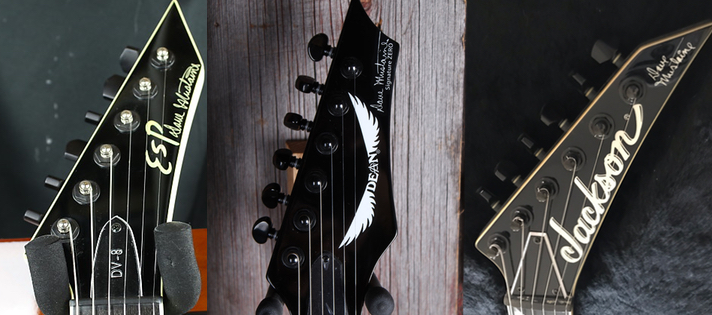
There are other instances when a guitarist changes endorsements when a brand goes out of business, which was the case when Dimebag started working with Washburn after Dean temporarily went out of business in the mid-'90s. Others still leave signature deals to start their own brands: Eddie Van Halen's mainstay Wolfgang model has been produced by both Peavey and Ernie Ball Music Man, and is now being offered under his own name as part of the Fender family. Zakk Wylde left Gibson to start Wylde Audio, and Tosin Abasi recently left Ibanez to make his own eponymous line of eight-strings.
Whatever the case, the limited-production nature of signature guitars, combined with their idiosyncratic appeal, means that the signature guitar realm is one full of uniquely desired guitars that are hard to come by.
In pulling together the data for this article, I took yearly averages on the above models for guitars that sold on Reverb, filtering out those in poor or fair condition, as well as obvious outliers like guitars actually signed by the signatory artist. As always with this sort of piece, Reverb's numbers aren't necessarily reflective of the entire used guitar market, but hopefully at least line up along the general trend lines. It's also worth noting that despite the assumptions of some commenters when we post things like this, we're absolutely not trying to push the market one way or another, and are simply trying to highlight some trends we think are interesting.
Some other potential examples that came across my screen in the research for this included various Joe Bonamassa limited-edition Epiphone and Gibson models. These guitars tap into the fiercely loyal fanbase that Joe has cultivated over the years, and while a look at the data doesn't show a huge amount of increase, they do seem highly priced and prized from the get-go. The not-quite-a-J-Bass Fender Roscoe Beck model has gone up a bit, as has the short-lived series of JPM Ibanez models made for John Petrucci before he signed on with Ernie Ball Music Man.
There are also a lot of higher-end guitars that go up in price over time, but are difficult to prove out given the low total order volume. The collective limited-edition output of the Gibson Custom Shop with its many reissued Les Pauls is full of them, as are various limited-edition Fender Custom Shop and Paul Reed Smith pieces (though there does seem to be something going with the Dave Grissom model).
The same could also be said for higher-end offerings from ESP's vast artist stable, and generally speaking, I was surprised to not find as many metal signature guitars following the pattern, given how closely associated that section of the guitar market is with the idea of the artist model. Part of this may be due to how frequently metal signature guitars come in an array of different sub-models, making it difficult to generalize an encompassing trend, and part of it, frankly, might just be that we sell fewer used guitars of this sort on Reverb compared to Fender Strats.
If you have any other signature guitars you think hold specific appeal or intrigue, drop a note in the comments below. And as a final note, a quick shoutout to the folks over on The Gear Page, where a recent thread about signature guitars inspired this post.
